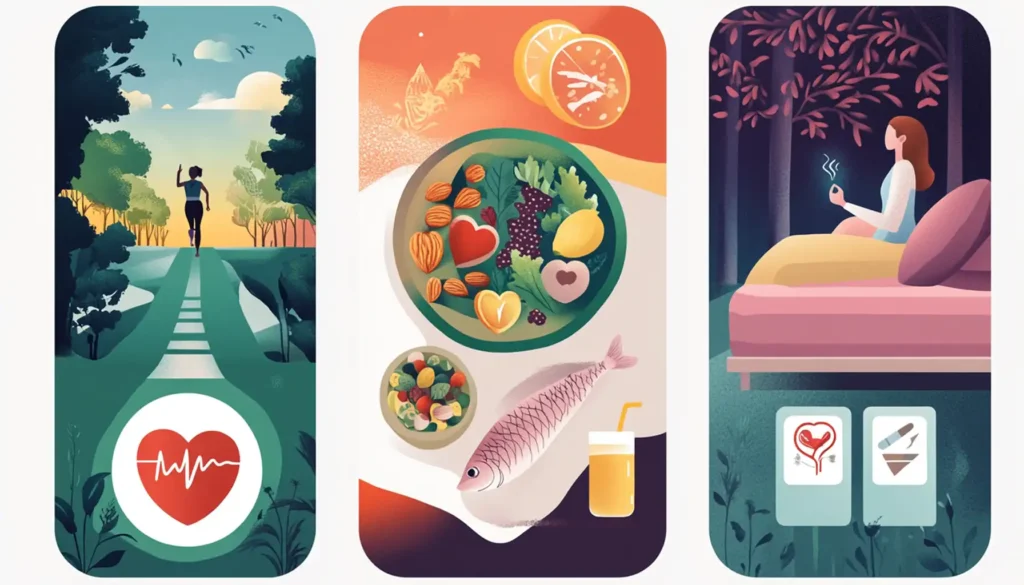Heart attacks remain one of the leading causes of death worldwide, with millions affected each year. The good news? Many risk factors for heart disease are within your control, and adopting natural ways to lower heart attack risk can have a profound impact on your heart health. Small, consistent lifestyle changes can significantly reduce your chances of heart disease without relying solely on medication.
These natural approaches are not just about prevention—they’re about creating a healthier, more resilient cardiovascular system that supports your overall well-being. By incorporating simple habits like eating nutritious foods, exercising regularly, and managing stress, you can protect your heart and improve your quality of life.
Let’s break down how natural interventions can strengthen your heart and why they’re so effective.
Why Choose Natural Ways to Reduce Heart Attack Risk?
Relying solely on medication may not address the root causes of heart disease. Natural prevention strategies work by improving the overall function of your cardiovascular system. Here’s why adopting natural methods is important:
- Address Root Causes: Lifestyle changes tackle underlying issues like high blood pressure, cholesterol, and inflammation.
- Sustainable Results: Natural interventions promote long-term health benefits that go beyond quick fixes.
- Improve Overall Well-Being: These strategies not only protect your heart but also boost mental health, immunity, and energy levels.
What You’ll Learn in This Guide
In this article, you will discover:
- The best heart-healthy foods to include in your daily diet to nourish your cardiovascular system.
- Natural ways to reduce stress and improve heart function, helping you manage one of the biggest risk factors for heart attacks.
- Herbal remedies and lifestyle tips that have been proven to naturally lower your heart attack risk.
Heart health doesn’t have to be complicated. By focusing on simple, achievable changes, you can strengthen your heart and enjoy a healthier, more active life.
Are You Ready to Take Control of Your Heart Health?
Improving your heart health naturally is a journey that starts with small steps. Whether it’s swapping processed foods for whole foods, incorporating a daily walk, or practicing mindfulness to reduce stress, these changes can lead to a healthier heart and a longer life.
Let’s explore these natural methods to protect your heart and take control of your health—because prevention is always better than cure.ral solutions!
Understanding Heart Attack Risk Factors
A heart attack doesn’t happen overnight; it’s the result of a combination of risk factors that build up over time. Understanding these risk factors is the first step in reducing your risk naturally.
Common Risk Factors
Certain risk factors significantly increase your likelihood of experiencing a heart attack, including:
- High Blood Pressure (Hypertension): When your blood pressure is consistently high, it puts added stress on your arteries, making them more prone to damage.
- High Cholesterol Levels: Excess LDL (bad cholesterol) leads to plaque buildup in the arteries, which can cause blockages and increase your risk of a heart attack.
- Smoking: Tobacco damages blood vessels and raises blood pressure, making smokers far more likely to experience heart problems.
- Obesity: Excess body weight puts more strain on the heart and is often linked to high blood pressure, high cholesterol, and diabetes.
- Diabetes: People with diabetes are at a higher risk of heart disease due to their blood vessels being more prone to damage.
- Stress: Chronic stress can increase blood pressure and trigger unhealthy coping mechanisms like overeating or smoking.

The Role of Genetics vs. Lifestyle
While genetics play a role in heart disease risk, lifestyle choices have a greater impact. Even if you have a family history of heart disease, adopting heart-healthy habits can significantly reduce your risk.
For example, a person with a genetic predisposition to high cholesterol can still lower their heart attack risk by eating a balanced diet, exercising, and avoiding smoking. Conversely, someone without a genetic predisposition could increase their risk through poor lifestyle habits.
Why Prevention Is Key
Preventing a heart attack is much easier than treating its consequences. Early lifestyle changes can:
- Lower blood pressure and cholesterol levels.
- Improve heart function and reduce plaque buildup.
- Prevent the progression of cardiovascular disease.
Prevention is about making small, consistent changes in your daily habits to promote a healthier cardiovascular system. By understanding these risk factors and addressing them, you’re taking the most critical step toward a longer, healthier life.
Natural Ways to Lower Heart Attack Risk
Heart attacks are preventable in many cases, and adopting natural lifestyle changes can significantly reduce your risk. Below are proven ways to support your heart health naturally.
Eat a Heart-Healthy Diet 🥗
Your diet plays a crucial role in heart health. By focusing on whole, unprocessed foods, you can reduce inflammation, lower cholesterol levels, and support overall cardiovascular function.
- Focus on Whole Foods:
Include more fruits, vegetables, whole grains, nuts, and seeds in your daily meals. These foods are packed with essential nutrients like fiber, antioxidants, and healthy fats that support heart health. - Reduce Processed Foods and Refined Sugars:
Limit your intake of processed snacks, sugary drinks, and fast food. These foods are high in sodium, unhealthy fats, and sugars, which can increase your blood pressure and cholesterol. - Specific Foods That Promote Heart Health:
Incorporate heart-friendly foods into your diet, such as:- Leafy Greens: Rich in vitamins, minerals, and antioxidants.
- Fatty Fish: Salmon, mackerel, and sardines are high in omega-3 fatty acids.
- Nuts and Seeds: Almonds, walnuts, and flaxseeds can help reduce bad cholesterol.
Quick Tip:
Try swapping unhealthy snacks with heart-friendly alternatives like fruit, yogurt, or a handful of nuts.
Get Regular Physical Activity 🏃♂️
Exercise strengthens your heart, lowers blood pressure, and improves circulation, reducing your risk of a heart attack.
- The Importance of Cardio Exercises for Heart Health:
Cardiovascular exercises, such as walking, cycling, swimming, and running, help keep your heart strong by improving your blood flow and reducing plaque buildup in your arteries. - How Much Exercise You Need Per Week:
The American Heart Association recommends at least 150 minutes of moderate-intensity exercise or 75 minutes of vigorous exercise per week. That breaks down to just 30 minutes, five days a week. - Easy Ways to Incorporate Exercise into Your Routine:
- Take the stairs instead of the elevator.
- Walk or bike to work instead of driving.
- Do short bursts of exercise during your work breaks.
Quick Tip:
Even small changes, like parking farther from the entrance or taking a 10-minute walk after meals, can make a big difference over time.

Manage Stress Levels 🧘♀️
Chronic stress can increase your risk of heart attack by raising blood pressure and inflammation levels.
- How Chronic Stress Impacts Heart Health:
Stress triggers the release of hormones like cortisol and adrenaline, which can raise your blood pressure and heart rate. Over time, chronic stress can damage your heart and blood vessels. - Natural Ways to Reduce Stress:
- Meditation: Practicing mindfulness can help lower stress levels.
- Yoga: Combines physical movement with mental relaxation.
- Hobbies: Activities like reading, painting, or gardening can be therapeutic.
- The Link Between Stress Management and Heart Health:
Studies show that people who practice stress-reducing activities regularly have a lower risk of heart-related issues.
Quick Tip:
Take five minutes daily to breathe deeply and focus on positive thoughts.
Improve Sleep Quality 😴
Poor sleep can increase your risk of heart attack by raising blood pressure, increasing stress levels, and contributing to weight gain.
- Why Good Sleep Is Critical for Heart Health:
Your body needs sleep to repair and recharge. During sleep, your heart rate and blood pressure naturally decrease, giving your heart a much-needed rest. - Natural Ways to Improve Sleep:
- Establish a consistent sleep schedule.
- Create a comfortable sleep environment by reducing noise and light.
- Avoid caffeine and screens before bedtime.
- Link Between Poor Sleep and Increased Heart Attack Risk:
Studies show that people who sleep less than 6 hours per night have a significantly higher risk of heart attack compared to those who get 7-8 hours.
Quick Tip:
Try a calming bedtime routine, like reading or listening to soft music, to improve sleep quality.
Quit Smoking and Reduce Alcohol Intake 🚭🍷
Smoking and excessive alcohol consumption are two of the biggest contributors to heart disease.
- How Smoking and Alcohol Consumption Increase Heart Attack Risk:
Smoking damages your arteries, making them more prone to plaque buildup and blockages. Alcohol, especially in large quantities, can increase blood pressure and lead to weight gain. - Natural Ways to Quit Smoking and Limit Alcohol:
- Nicotine Replacement Therapy: Patches, gums, and lozenges can help curb cravings.
- Counseling and Support Groups: Talking to others who are going through the same journey can be motivating.
- Limit Alcohol Consumption: Opt for non-alcoholic beverages or limit alcohol to special occasions.
Quick Tip:
Replace smoking or drinking habits with healthier alternatives, like going for a walk or chewing gum.
Herbal Remedies for Heart Health
Herbal remedies have been used for centuries to promote cardiovascular health. Many natural herbs and supplements can help manage key risk factors like high blood pressure, cholesterol, and inflammation — all of which contribute to heart attack risk. Here’s a closer look at three powerful herbal remedies that can naturally support a healthier heart.
Garlic for Blood Pressure and Cholesterol
Garlic isn’t just a flavorful addition to meals; it’s a potent heart-boosting herb. The active compound in garlic, allicin, has been shown to help lower blood pressure and reduce bad cholesterol levels (LDL). Regular consumption of garlic can improve overall heart health by preventing plaque buildup in arteries and reducing the risk of atherosclerosis.
How to Use Garlic for Heart Health:
- Raw Garlic: Eating 1-2 cloves of raw garlic daily can provide the most benefits. Crush or chop the garlic and let it sit for a few minutes before consuming to activate the allicin.
- Garlic Supplements: If the taste of raw garlic is too strong, garlic capsules can be a convenient alternative.
- In Cooking: Incorporate garlic into your daily meals by adding it to soups, salads, or roasted vegetables.
Pro Tip: For maximum benefit, avoid cooking garlic at high temperatures for too long, as heat can reduce its effectiveness.

Turmeric and Ginger for Inflammation
Chronic inflammation is a major contributor to heart disease. Both turmeric and ginger are powerful anti-inflammatory herbs that help reduce the body’s inflammatory response, protecting the heart from damage caused by high blood pressure, cholesterol, and oxidative stress.
Turmeric:
Turmeric contains curcumin, a compound with strong anti-inflammatory and antioxidant properties. It can help reduce the risk of plaque formation in arteries, improve blood vessel function, and lower cholesterol levels.
How to Use Turmeric:
- Add turmeric powder to soups, stews, or smoothies.
- Make golden milk by mixing turmeric, ginger, and warm milk (or a plant-based alternative).
- Consider curcumin supplements for a more concentrated dose.
Ginger:
Ginger has been used in traditional medicine for its anti-inflammatory and blood-thinning effects, both of which benefit heart health. It can help reduce high blood pressure, improve circulation, and lower cholesterol levels.
How to Use Ginger:
- Drink ginger tea by steeping fresh ginger slices in hot water.
- Add grated ginger to stir-fries, smoothies, or baked goods.
- Take ginger supplements as directed by a healthcare professional.
Pro Tip: Pair turmeric with black pepper to enhance curcumin absorption by up to 2000%.
Omega-3 Fatty Acids for Reducing Heart Attack Risk
While omega-3 fatty acids are commonly found in fish, they can also be sourced from plant-based herbs and oils. Omega-3s are essential for reducing triglyceride levels, lowering blood pressure, and preventing plaque buildup in the arteries — all critical factors in preventing heart attacks.
Plant-Based Sources of Omega-3s:
- Flaxseed: Add ground flaxseed to your morning smoothie, oatmeal, or yogurt.
- Chia Seeds: Sprinkle chia seeds on salads, cereal, or baked goods for a boost of omega-3s.
- Walnuts: Eat a handful of walnuts daily to support heart health.
- Hemp Seed Oil: Use hemp seed oil in dressings or smoothies for an easy omega-3 boost.
Benefits of Omega-3 Fatty Acids for Heart Health:
- Reduce blood pressure.
- Lower triglycerides (a type of fat in the blood).
- Prevent the formation of blood clots.
- Decrease inflammation in blood vessels.
Combining Herbal Remedies for Maximum Heart Health
For the best results, combine these herbal remedies in your daily routine. For example:
- Start your day with a ginger and turmeric tea.
- Add garlic and flaxseeds to your lunch salad.
- Snack on walnuts in the afternoon.
These small changes can make a big difference in supporting heart health naturally. However, it’s essential to consult with a healthcare provider before adding supplements or herbs to your routine, especially if you take medication.
FAQs About Natural Heart Health
What Are the Best Natural Supplements for Heart Health?
Several natural supplements have been studied for their ability to promote heart health. Omega-3 fatty acids, found in fish oil or flaxseed oil, can reduce triglycerides and improve overall heart function. Garlic supplements are known to lower blood pressure and cholesterol levels, while Coenzyme Q10 (CoQ10) helps improve heart energy and function. Turmeric, rich in curcumin, has powerful anti-inflammatory effects that protect against heart disease. Always consult your doctor before starting any supplement regimen.
Can Heart Attack Risk Be Reduced Without Medication?
Yes, for many people, lifestyle changes can significantly reduce heart attack risk without medication. Regular physical activity, a balanced diet, stress management, and quitting smoking are all proven methods to lower risk naturally. However, some individuals with genetic predispositions or existing conditions may require medication to manage their risk effectively. It’s essential to work closely with a healthcare professional to find the best approach for your specific situation.
How Long Does It Take to See Results from Lifestyle Changes?
The timeline for seeing results depends on the specific lifestyle changes you make. For instance, improvements in blood pressure and cholesterol can be seen in a few weeks to a few months after adopting a heart-healthy diet and exercise routine. Weight loss and improved cardiovascular endurance may take several months. Stress reduction and better sleep quality often show immediate benefits in overall well-being, which in turn contributes to better heart health. The key is consistency—small, sustainable changes over time lead to long-term heart health improvements.
Introduction: Natural Ways to Lower Heart Attack Risk
A heart attack can happen unexpectedly, but there are ways to lower your risk naturally. Heart disease remains a leading cause of death worldwide, yet many of its risk factors are within your control. By making small, consistent lifestyle changes, you can protect your heart and improve your overall well-being. Natural approaches focus on supporting your cardiovascular system through diet, exercise, stress management, and herbal remedies, which can be as effective as medication when practiced regularly.
Adopting natural methods to lower heart attack risk doesn’t mean overhauling your life overnight. Instead, it’s about making mindful choices in your everyday routine—choosing a healthy meal, taking a brisk walk, reducing stress, or swapping unhealthy habits for heart-friendly ones. These actions can reduce common risk factors like high blood pressure, high cholesterol, and chronic inflammation, which are key contributors to heart attacks.
In this article, you’ll discover:
- Proven natural ways to lower heart attack risk through dietary choices, exercise, and lifestyle changes.
- Herbal remedies that support heart health, including garlic, turmeric, and omega-3 fatty acids.
- Practical tips to improve your lifestyle and build a healthier heart over time.
Whether you’re looking to protect your heart after a warning sign or want to maintain long-term cardiovascular health, these natural solutions will guide you toward a stronger, healthier heart. Let’s explore how to take control of your heart health with confidence and ease.


0 thoughts on “Natural Ways to Lower Heart Attack Risk: Proven Tips for a Healthier Heart”